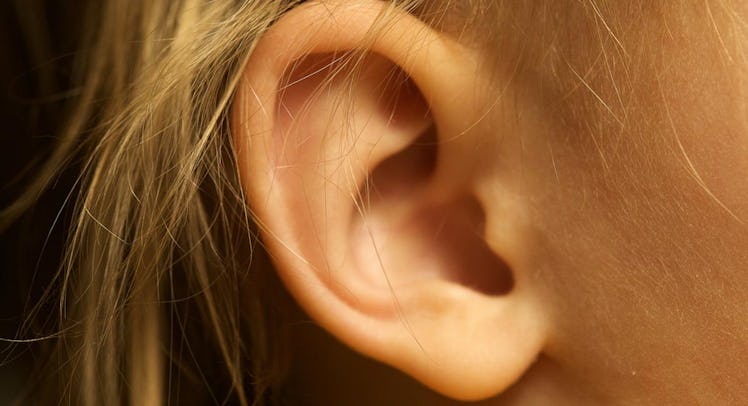How To Recognize Hearing Problems In Your Toddler
Keep an eye on their ears.

You’ve pretty much taken your hearing for granted, what with all damage you did to your ear drums during your death metal phase. But even though you’ve been lax with your hearing, your toddler hasn’t, which requires you keep an eye out for their hearers. Because if they have problems hearing, they’ll have problems socializing. And that’s pretty important for life in general. Here’s what you need to know to keep an ear to your kids’, well, ears.
Why It’s Important
So why all this concern about hearing? After all, it’s one of the few tests that daycares and schools regularly perform on children. The acute interest in how your kid is taking in the world through their earholes is due to the fact that hearing is so crucial to learning how to speak. And speaking is so crucial to communication and socialization.
Causes Of Hearing Problems
Another issue with hearing is that there are so many things that could screw it up. These range from genetic issues to disease processes to obvious environmental issues such as exposure to loud noises. Here are some issues to be wary of:
- Prenatal Conditions: You may want to be wary If your partner was affected by preeclampsia or gestational diabetes.
- Genetics: If a history of hearing issues runs in your or your partner’s family, your kid could be at increased risk.
- Premature Birth: If your kid was born too early, their inner ear may not have had enough time to develop properly.
- Otitis Media: This is essentially a middle ear infection. They’re fairly common in kids, and fairly harmless. But repeated infections can cause damage.
- Head Injury: A big enough bonk could damage your kid’s brain enough to affect the way it processes sound. But this would be serious head trauma. No need to invest in a daily-wear helmet.
- Viral Infections: Particularly, when it comes to viral infections that affect the brain. Meningitis could have an effect on hearing, but so could the chickenpox or the flu.
- Loud Noises: This isn’t just a thing Brick Tamland shouts during arguments. You need to be aware that the loudness does not have to be prolonged in order to affect hearing. In fact, even a super loud short burst can cause hearing loss.
Signs Of Hearing Loss
Because your toddler isn’t the best at being able to tell you what the heck is going on, you’ll have to do some sleuthing in order to track down any hearing issues. This’ll require understanding where your kid should be and how they might be off track.
Another thing to keep in mind is that your kid might seem like they can’t hear you, but that doesn’t always mean they aren’t hearing you. Sometimes they just don’t want to hear you. But you get it. You haven’t heard your partner ask you to take out the trash for literally years. Here are a few signs your toddler has a hearing issue and not an I-don’t-give-a-crap-about-what-you’re-saying issue.
- Wants the TV volume higher
- Speaks louder than normal
- Does not respond when you whisper
- Asks “what?” more often, angering Samuel L. Jackson
- Watches you very carefully as you speak
- Cannot speak 2-word sentences
- Turns their “good” ear towards you as you speak
While these are all well and good, your parental intuition is also hugely important. If you suspect that something is off, head to your pediatrician. They’ll be able to figure out the best intervention if necessary. As for yourself, you may want to consider lowering the music a bit.
This article was originally published on